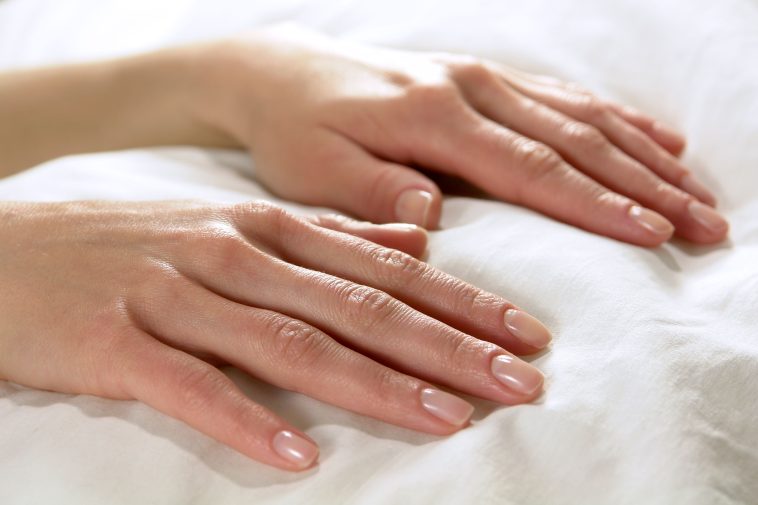We’ve all been there—you chip or break a nail and immediately ask yourself how to make your nails grow faster.
For some reason, breaking a nail always seems to happen at the most inopportune time, so I’m sure I’m not the only one who’s wondered how to fix a manicure ASAP. Luckily for us all, there are solutions. Even if you haven’t dealt with a broken nail before, but you’re just hoping to grow your nails to be longer and stronger, we’ve got you covered. From keeping a healthy diet to using cuticle oil or lotion regularly, helping your nails grow faster isn’t as hard as it may seem (there are plenty of natural home remedies you can try).
Keep in mind, though, everyone’s nails grow at different rates. “Nails, like hair, can be a reflection of our internal health, so the number one thing is to pay attention to your overall health,” says Stephanie Stone, an Essie celebrity manicurist based in Los Angeles. We tapped her and two dermatologists to weigh in on the eight best tips on how to make your nails grow faster.
Try minoxidilWondering where you’ve heard of minoxidil before? Minoxidil is the active ingredient in Rogaine, which treats hair loss. “Minoxidil stimulates hair growth by increasing blood flow to hair follicles,” says Ravi R. Patel MD, board-certified dermatologist and founder of House of Dermatology in Alpharetta, Georgia. It can actually have a similar effect on nails (after all, they’re both made of keratin). “Since the nail bed lies just beneath your nail and is rich in blood vessels, better circulation can mean healthier, quicker-growing nails,” he explains.
Using 5% topical minoxidil twice daily can help promote nail growth, says Carmen Castilla MD, board-certified dermatologist at New York Dermatology Group. It usually comes in foam or liquid form and “can be gently massaged into the nail area,” adds Patel. Accessibility won’t be an issue with topical minoxidil: It’s available over the counter without a prescription.
Another minoxidil option is going the oral route (2.5mg by mouth daily), though this one does require a prescription from your doctor. We’d probably stick to the topical option, since oral minoxidil “comes with potential side effects such as leg swelling, palpitations, and unwanted hair growth,” warns Castilla.
Rogaine 5% Minoxidil Foam
Get your collagenCollagen peptides are all the rage right now in wellness routines, and for good reason. The skin, nail, and hair health benefits this supplement can provide are dermatologist-approved: “Collagen is rich in amino acids like proline and glycine that support keratin production, the key protein in nails,” says Patel. “Studies have shown that taking 2.5 grams of collagen peptides daily can improve nail growth and reduce breakage and brittleness.” You can buy collagen peptides in powder form and stir a scoop into your morning coffee, tea, or smoothie.
Vital Proteins Grass Fed Collagen Peptides Powder
Skip the manicureAs much as we love our trips to the salon and fun nail art, remember to give your fingertips regular breaks from manis, nail polish, and nail polish remover, especially if you have gel nails or acrylic nails. “Frequent exposure to gel polish, acrylics, and harsh acetone removers can thin your natural nails over time, making them weaker and more prone to damage,” says Dr. Patel. While it may not directly cause your nails to grow more quickly, giving them a little time to recover will give them the chance to grow out without chipping or breakage.
Check for nutritional deficienciesTo the doctor’s office we go: Make sure to schedule regular checkups with your physician, such as a board-certified internal medicine doctor, “because internal factors such as low iron or abnormal thyroid hormone levels can impact nail growth,” says Dr. Castilla. Specific vitamins like biotin, iron, zinc, vitamin C, vitamin D, and vitamin B12 are essential for nail growth, adds Dr. Patel, and deficiencies can not only lead to slow-growing nails, but also brittle or ridged ones. Your doctor will order a quick blood test and advise which supplements to add to your daily routine to restore balance and increase nail strength.
Outside of the doctor’s office, maintaining a well-rounded diet is key (for anything, not just nail health). Ensuring your diet is rich in fruits, vegetables, and proteins will help support nail growth (these foods contain nutrients needed for nail growth, like amino acids, vitamin C, magnesium, vitamin D, vitamin A, and vitamin B6, among others, explains Dr. Patel).
Before your big trip to the supplement aisle at the pharmacy, make sure to consult your physician: “Over-supplemenation can also lead to nail growth problems, so routine supplementation in otherwise healthy people with a balanced diet is not recommended,” warns Patel.
Clean up those cuticlesMaintaining your cuticles and the surrounding skin doesn’t just look nice—it also can keep your nails safe and help their growth rate, believe it or not. But why? “Your cuticles protect the nail matrix, the area where new nail cells are formed,” says Dr. Patel. “If your cuticles are damaged (from picking or cutting), the matrix can become inflamed or infected, slowing nail growth or leading to abnormalities.”
Not to sound too scary, but once those stem cells are damaged or destroyed, normal nail growth may no longer be possible, says Dr. Castilla. Nail infections (which cuticles protect against) can also damage the stem cells and prevent future healthy nail growth, she adds. So it’s safe to say we should definitely skip the nail biting and cuticle picking (I know, it can be such a hard habit to break) and focus instead on hydration.
But how to moisturize your cuticles and nail plate? “I sound like a broken record when talking to my clients encouraging them to apply cuticle oil excessively,” says Stone. Toss one in your bag, car, desk drawer, or wherever it makes it easy to remember to reapply throughout the day.
Essie On a Roll Apricot Nail & Cuticle Oil
Julep Roll With It Cuticle Oil
Sip some milkSure, new alternatives to dairy milk are popping up all the time lately (pistachio milk, anyone?). But sometimes an oldie can really be a goodie. So ordering a latte with whole milk may not sound as sexy as your go-to oat milk latte, but don’t be afraid to lean in. “Milk is packed with calcium, protein, and vitamin D—all essential nutrients for strong, healthy nails,” says Dr. Patel. “Calcium contributes to nail hardness and strength, while protein helps build keratin.”
If you’re allergic or lactose intolerant, finding nondairy alternatives with calcium and vitamin D can still help support overall nail health too.
Grab a nail strengthenerGetting strong nails isn’t just about internal factors (though experts will admit that’s a huge part of it). Using products will also do the trick. Nail hardeners, cuticle moisturizers, base coats, and protective polish are all nail treatments that are easy to use and even can be formulated to treat specific issues, such as repairing brittle nails from UV gel damage, improving the nails’ surface and texture, and more. “Keeping a protective layer of polish can really help the strength of the nail more than you’d think,” says Stone. “A little barrier can act as a shield throughout the day, and your nails will have grown out before you know it.”
ISDIN Si-Nails Fast Absorbing and Hydrating Nail Serum Strengthener
Essie to the Rescue UV Gel Damage Repair
File your nailsKeep a nail file on hand in case of emergencies. Though filing your nails won’t directly cause faster growth, being able to take care of any little snags before they become disastrous (a.k.a., your nail breaks) will absolutely help. “It’s the same as getting regular haircuts,” says Stone. “Haircuts prevent split ends traveling up your strands, which creates breakage, and a snag leads to broken nails.” Smooth out the edges of your nails regularly—don’t wait until your next nail appointment, she recommends. A little bit of consistent nail care will go a long way (even wearing gloves when you’re washing dishes or using cleaning products makes a difference, as “too much water or exposure to harsh chemicals can weaken the nail plate, leading to increased breakage,” says Dr. Castilla).
Consider a biotin supplementBiotin supplements are super popular but can be controversial (biotin may interfere with lab tests), but if you’re down to try anything and, more importantly, your doctor is okay with it, then it’s worth considering. It may “improve nail hardness and thickness but not necessarily speed of nail growth,” says Castilla, who adds that if it does work, it will require at least two months of consistent use to see the potential benefits. “In the studies that showed change, nail brittleness recurred a few weeks after biotin supplementation was stopped,” she adds.
Catharine Malzahn is the contributing associate beauty editor at Glamour.





GIPHY App Key not set. Please check settings